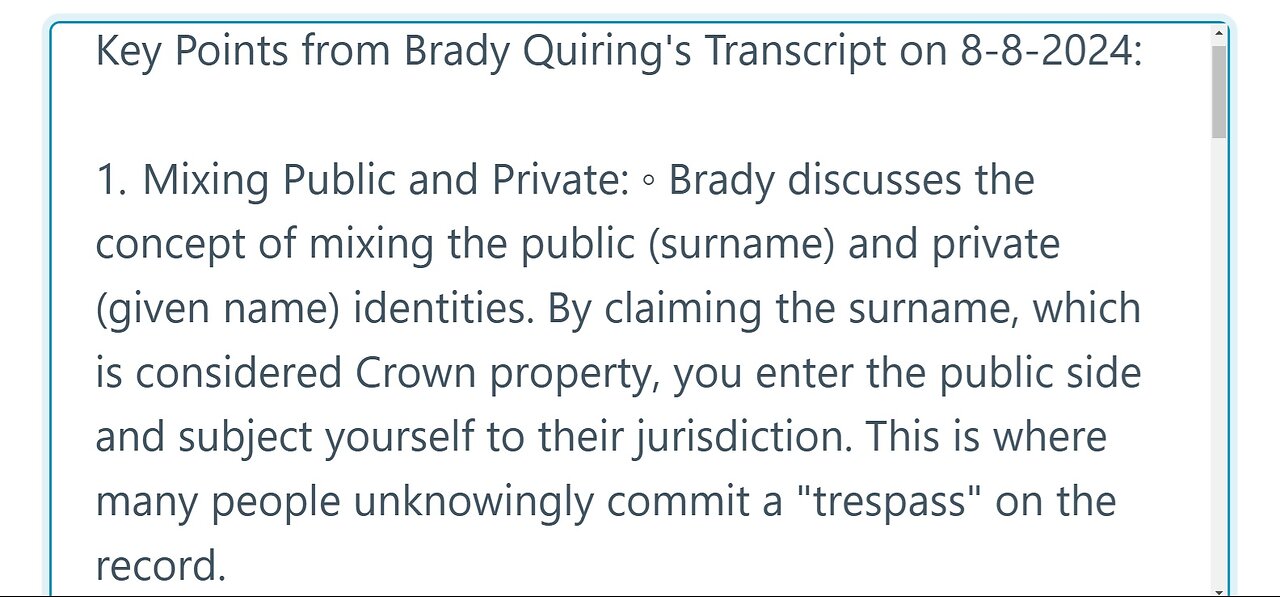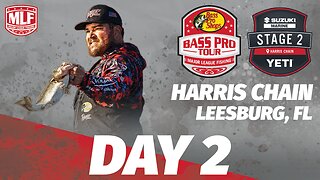Premium Only Content

Key Points from Brady Quiring's Transcript on 8-8-2024:
Zoom 7 PM Alberta time daily https://us02web.zoom.us/j/6945489985?pwd=UllwRmwzRUhWS2pXUWNQODNEbnhSZz09The de-facto system are Masquerading as a government ,
https://rumble.com/c/c-1516344
The Great Canadian Illusion
https://rumble.com/v6e4mrd-the-great-canadian-illusion.html?e9s=src_v1_ucp
The Secret Life of Canada - You do Not Want to Miss This (Share
https://rumble.com/v6au8a7-the-secret-life-of-canada-you-do-not-want-to-miss-this-share.html?e9s=src_v1_ucp
Constitution of The Sovereign Republic of (Liberty)
https://rumble.com/v6bfa1s-constitution-of-the-sovereign-republic-of-liberty.html?e9s=src_v1_ucp
Key Points from Brady Quiring's Transcript on 8-8-2024:
1. Mixing Public and Private: ◦ Brady discusses the concept of mixing the public (surname) and private (given name) identities. By claiming the surname, which is considered Crown property, you enter the public side and subject yourself to their jurisdiction. This is where many people unknowingly commit a "trespass" on the record.
2. Challenge to Authority: ◦ In court, Brady responded to the question, "Are you Brady Quiring?" by stating, "I’ve been known to use that name." This statement avoids direct acceptance of the name as his own, which immediately put the judge on edge. Brady emphasized that the judge, by reacting, became a witness rather than an impartial adjudicator, which is against court procedure.
3. Jurisdiction Over the Given Name: ◦ The judge acknowledged that he could not call Brady by his formal (given) name, suggesting that the court had no jurisdiction over the private individual—only over the public persona represented by the surname.
4. Use of Trust and Property:
◦ Brady explains that the all-caps name, often associated with a person's legal identity, is not something an individual owns but rather something held in trust by the Crown. When someone claims this name, they take on the role of trustee, thus assuming obligations and liabilities associated with it.
5. Surrendering Interests to the Crown: ◦ By surrendering the interest in the legal (public) identity back to the Crown, Brady asserts that he retains his equitable (private) interest while relieving himself of legal obligations. This action leads to the case being dismissed, as the court no longer has jurisdiction once the interests are merged.
6. Application Across Multiple Cases: ◦ Brady mentions successfully applying this approach in various situations, including car loans, child support cases, and interactions with the sheriff's office. Each time, the strategy of surrendering legal interests back to the Crown has resulted in favorable outcomes.
7. Philosophical and Religious Parallels: ◦ Brady draws a parallel between his legal strategy and spiritual teachings, likening the surrender of legal obligations to the act of surrendering to a higher power for spiritual salvation.
-
 2:15
2:15
We The People - Constitutional Conventions
17 hours agoUS Government is out of control “It's my property. So it's absolute madness.”
411 -
 LIVE
LIVE
Melonie Mac
55 minutes agoTomb Raider the Angel of Darkness Remaster Stream!
252 watching -
 LIVE
LIVE
Major League Fishing
2 days agoLIVE! - Bass Pro Tour: Stage 2 - Day 2
689 watching -
 DVR
DVR
Benny Johnson
2 hours agoTrump Unleashes MASS FIRINGS Across Government, Feds Scramble to COVER UP Their Crimes | PANIC IN DC
47.6K52 -
 2:04:41
2:04:41
Tim Pool
3 hours agoAdult Content, OnlyFans DESTROYS Society & Relationships | The Culture War with Tim Pool
58.7K38 -
 1:02:30
1:02:30
The Dan Bongino Show
4 hours agoDeranged Libs Go All In For Ukraine War and Govt. Corruption (Ep. 2423) - 02/14/2025
447K688 -
 55:07
55:07
The Rubin Report
2 hours agoOval Office Crowd Stunned by RFK Jr.’s Unexpected Admission in His Acceptance Speech
53.7K42 -
 1:06:38
1:06:38
Steven Crowder
4 hours agoTruth in Love: Homosexuality in the Church
195K262 -
 2:03:01
2:03:01
LFA TV
17 hours agoJUDGE WARS AGAINST TRUMP! | LIVE FROM AMERICA 2.14.25 11AM
30.4K20 -
 LIVE
LIVE
Film Threat
16 hours agoCAPTAIN AMERICA: BRAVE NEW WORLD REVIEW! | Film Threat Livecast
146 watching